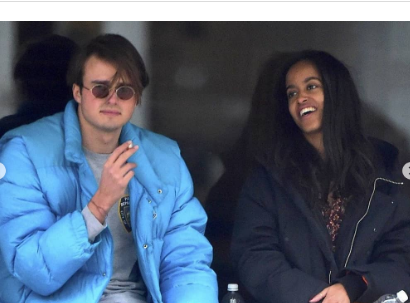Malia Obama, a Harvard student, transitioned from presidential daughter to private citizen navigating young adulthood in a quiet but unquestionably elegant manner. By the end of 2017, public interest was piqued by a single moment that was recorded during a Harvard-Yale football game. She was standing at the nexus of history and contemporary romance, kissing with confidence a tall British student who would subsequently be identified as Rory Farquharson, a young man from the UK’s prestigious Rugby School.

Farquharson’s background was very similar to Malia’s: rich upbringing, distinguished education, and a tacit expectation to live up to a last name. The two heirs of different countries intertwined at an Ivy League university felt remarkably comparable to a well-written story. However, it was more than only their ancestry that captured the public’s interest. It was how strikingly well they managed to maintain intimacy in the glaring light of international attention.
Malia Obama — Personal and Relationship Bio
| Detail | Information |
|---|---|
| Full Name | Malia Ann Obama |
| Date of Birth | July 4, 1998 |
| Birthplace | Chicago, Illinois |
| Nationality | American |
| Education | Harvard University (2017–2021) |
| Profession | Writer, Director |
| Notable Parent(s) | Barack and Michelle Obama |
| Public Relationship | Rory Farquharson (British, Harvard classmate) |
| Relationship Duration | Approximately 4 years (2017–2021) |
| Famous Moments Together | Harvard football game kiss, pandemic cohabitation |
When lockdowns and grounded aircraft arrived in 2020, Farquharson was unable to go back to his hometown. He stayed with the Obamas instead of rushing to find other arrangements. Always charming in interviews, Barack spoke about the stay with a mixture of comedic honesty and paternal hesitancy. He brought up a particularly amusing grievance while on The Bill Simmons Podcast: the grocery bill. He laughed and remarked, “Young men eat.” It’s strange to observe them eating. My grocery bill increased by thirty percent.
The American public was given a very vivid picture of the dynamics of the Obamas’ home through just one story. In addition to being political figures, they were now parents negotiating the typical awkwardness of adolescent romance in intimate settings. Not only was Rory welcomed into their home, but it also served as a silent affirmation, a sign of trust, and perhaps a test of their ability to handle difficult situations emotionally.
The absence of spectacle in the Malia-Rory story is what makes it so captivating. Without planned paparazzi photos, red carpet photo ops, or Instagram announcements, their romance developed naturally. This break from the conventions of celebrity couples was especially helpful in redefining how prominent young people handle their personal life. Their deliberate and calculated stillness gave them space to develop without feeling under pressure to perform. This method was surprisingly subtle for Gen Z, who frequently live with well manicured personas.
By 2022, however, there were faint indications of change. There was conjecture that the relationship had ended because Malia was no longer seen by Rory’s side and was instead seen interacting with other friends and peers. There were no subsequent public declarations. No negative effects on social media. It seemed to finish as gently as it had started. It felt significant as well. Online analysis of high-profile breakups has increased the societal fascination with them in recent years. However, Malia forged a markedly better course—one that was dignified and determined.
Even though they are intimate, her relationship choices are never completely private. Malia’s simple visibility in public has frequently served as a gauge for changing discussions around gender, ethnicity, and legacy. Commenters rekindled conversations about role models when she was spotted smoking with Rory, a habit he apparently carried with him. It’s ironic that this daughter, who once encouraged her father to give up smoking, is now imitating a habit that used to trouble him. Even while it was intrusive at times, the public conversation highlighted a truth that prominent children must deal with: it is nevertheless difficult to be free to be flawed.
Malia’s journey reflects that of other well-known kids through these instances, reshaping legacy via character rather than inheritance. Think of Sasha Obama’s modest campus life, Ava Phillippe’s avant-garde artwork, or even Blue Ivy Carter’s unexpectedly sophisticated performances. Each signifies a new generation of well-known children who choose authenticity over the glare of the spotlight.
Malia’s poised presence is what makes her handling of celebrity so novel. She doesn’t disappear, but she also doesn’t go too far. She lets her work—screenwriting, short films, and creative development—speak for her in recent interviews and public endeavors. No individual brand. No fake mystique. Simply quiet ambition.
Michelle Obama famously jokingly said, “Don’t wind up on Page Six,” as her one piece of advise to Malia prior to college. It’s arguable if Malia was successful in doing so, but what is certain is how remarkably adept she has grown at manipulating her story. Although she has never claimed to be a media strategist, she has a deep understanding of exposure, tone, and timing.
Her method is informative when seen in a larger context. Her soft presence concept is gaining traction in the context of influencer burnout and growing digital fatigue. For young women who want to establish themselves independently of popular approval, it is very liberating. Her narrative challenges us to reconsider what it is to be loved, to be seen, and to let go without putting on a show for the public.
Perspective is also provided by Barack’s permissive attitude toward his daughters’ relationships. He acknowledged Michelle’s impact on character development and emphasized that self-assurance should never be equated with external validation. Only half-jokingly, he said, “They have Secret Service.” Beneath the humor, however, is a scathing observation: raising children who feel safe enough to date—and break up—on their own terms requires discipline, community, and quiet strength.
